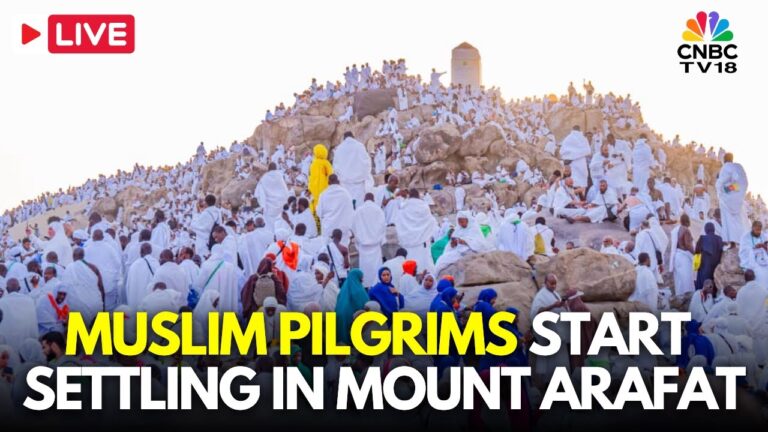[ad_1]
Hajj LIVE coverage typically encompasses various aspects of the pilgrimage to Mount Arafat near Mecca. Here’s a breakdown of what such coverage might include:
Geographic Context:
- Location: Mount Arafat, a plain approximately 20 kilometers (12 miles) east of Mecca, Saudi Arabia.
- Significance: The site where the Prophet Muhammad (peace be upon him) delivered his Farewell Sermon. Spending the day on Arafat is the most important ritual of Hajj.
- Terrain: A vast, open plain with limited natural shade.
Timing & Schedule:
- Date: The 9th day of Dhu al-Hijjah, the 12th month of the Islamic lunar calendar. The Islamic calendar is approximately 11 days shorter than the Gregorian calendar, so the date shifts each year.
- Duration: Pilgrims typically arrive at Arafat after sunrise and remain there until sunset.
- Activities: The time is spent in prayer, reflection, repentance, and supplication.
Rituals and Practices:
- Wuquf: The most important ritual, standing (or sitting) in contemplation before God from noon until sunset.
- Prayer: Pilgrims perform the Dhuhr (noon) and Asr (afternoon) prayers combined and shortened.
- Supplication (Dua): Individual and collective prayers are offered, seeking forgiveness and blessings.
- Sermons: Religious scholars often deliver sermons reminding pilgrims of the significance of the day and providing guidance.
- Quran Recitation: Many pilgrims recite the Quran throughout the day.
Pilgrim Demographics and Logistics:
- Numbers: Millions of pilgrims participate in Hajj each year.
- Nationalities: Pilgrims come from all over the world, representing diverse cultures and languages.
- Transportation: Pilgrims are transported to Arafat by buses, trains (where available), and on foot.
- Accommodation: Tented camps are set up to provide temporary shelter and rest areas.
- Medical Facilities: Extensive medical services are available to address health needs.
- Security: Security personnel are deployed to ensure the safety and order of the pilgrims.
- Food and Water: Provisions for food and water are provided.
Media Coverage Details (N18G):
- Network: N18G likely refers to a specific news network or media outlet (further context needed to identify the exact organization).
- Live Feed: The broadcast will show live footage of pilgrims arriving at Mount Arafat, engaging in prayer and supplication, and listening to sermons.
- Commentary: Commentators and religious scholars provide insights into the rituals, their significance, and the spiritual experience of Hajj.
- Interviews: Interviews with pilgrims, organizers, and experts may be included.
- Behind-the-Scenes: Coverage of logistical operations, medical services, and security arrangements.
- Cultural Insights: Showcasing the diverse cultures of the pilgrims and their shared devotion.
- Technology: Utilizes broadcast technology, including cameras, satellite feeds, and streaming platforms, to deliver live coverage globally.
- Social Media: Engaging with audiences through social media platforms, sharing updates, images, and videos.
Post-Arafat Activities:
- Muzdalifah: After sunset, pilgrims depart for Muzdalifah, an area between Arafat and Mina.
- Collecting Pebbles: In Muzdalifah, pilgrims collect pebbles to use for the symbolic stoning of the devil in Mina.
Potential Issues Covered:
- Crowd Management: Strategies for managing the large crowds and ensuring the safety of pilgrims.
- Health Concerns: Measures to prevent and treat heatstroke, dehydration, and other health issues.
- Environmental Impact: Addressing the environmental impact of such a large gathering.
- Security Threats: Counterterrorism measures and security protocols.
- Political Context: How the Hajj is viewed within the broader political context of the region and the Muslim world.
[ad_2]

